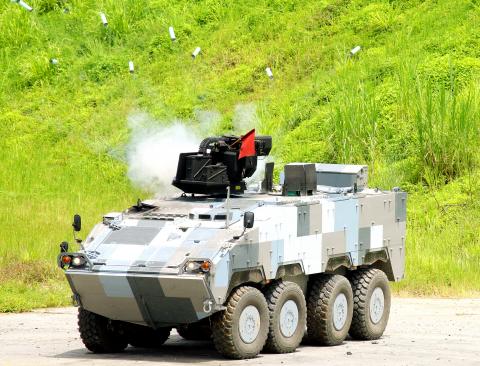Taiwan’s problem-plagued CM-32 “Clouded Leopard” armored infantry fighting vehicle ran into more difficulties this week with the announcement that delivery would be delayed by another five years, but the military denied that this was linked to steel-plate cracking and other design issues.
First unveiled in January 2005, the domestically produced eight-wheel-drive vehicle has encountered various problems from its inception and came close to being abandoned altogether in 2009 over design flaws and budgetary irregularities at the Ministry of National Defense, which resulted in the legislature’s decision to freeze two-thirds of the production budget.
Earlier this week, the Chinese-language United Daily News reported that cracking in the vehicle’s steel plating — which first surfaced three years ago — as well as disagreements over what type of cannon to use on the mounted turret, had prompted a decision to delay delivery of the vehicle by five years to 2019.

Photo: CNA
The 25-tonne Clouded Leopard, a joint project between the Ordnance Readiness Development Center and the Chungshan Institute of Science and Technology started in 2000, is intended as a replacement for older armored personnel carriers and light-armed vehicles, including M113s and V-150s. Mass production, initially scheduled for 2007, began in late 2010, with the army set to procure 652 CM-32s for NT$58 billion (US$1.8 billion), or about US$2.7 million per vehicle.
Under the plan, the vehicles were scheduled for delivery in 2014. So far, only a limited number have been handed over to the army and to the Military Police for presidential protection.
Clarifying the matter, the min said it had suspended mass production after the chassis of four of the 14 CM-32s manufactured in 2008 displayed some cracks, but resumed full production in December 2010 after the problem was resolved.
“We instructed Army Command Headquarters, the Ordnance Readiness Development Center and the CSIST to form a taskforce, and to invite academics to jointly ascertain the causes of the cracks and address the problems,” the ministry said.
Production of all 652 CM-32s will be done by 2019, it said, without providing reasons for the current delay.
Additional reporting by Stacy Hsu

ACTION PLAN: Taiwan would expand procurement from the US and encourage more companies to invest in the US to deepen bilateral cooperation, Lai said The government would not impose reciprocal tariffs in retaliation against US levies, President William Lai (賴清德) said yesterday, as he announced five strategies to address the issue, including pledging to increase Taiwanese companies’ investments in the US. Lai has in the past few days met with administrative and national security officials, as well as representatives from various industries, to explore countermeasures after US President Donald Trump on Wednesday last week announced a 32 percent duty on Taiwanese imports. In a video released yesterday evening, Lai said that Taiwan would not retaliate against the US with higher tariffs and Taiwanese companies’ commitments to

Intelligence agents have recorded 510,000 instances of “controversial information” being spread online by the Chinese Communist Party (CCP) so far this year, the National Security Bureau (NSB) said in a report yesterday, as it warned of artificial intelligence (AI) being employed to generate destabilizing misinformation. The bureau submitted a written report to the Legislative Yuan in preparation for National Security Bureau Director-General Tsai Ming-yen’s (蔡明彥) appearance before the Foreign Affairs and National Defense Committee today. The CCP has been using cognitive warfare to divide Taiwanese society by commenting on controversial issues such as Taiwan Semiconductor Manufacturing Co’s (TSMC, 台積電) investments in the

HELPING HAND: The steering committee of the National Stabilization Fund is expected to hold a meeting to discuss how and when to utilize the fund to help buffer the sell-off The TAIEX plunged 2,065.87 points, or 9.7 percent, to close at 19,232.35 yesterday, the highest single-day percentage loss on record, as investors braced for US President Donald Trump’s tariffs after an extended holiday weekend. Amid the pessimistic atmosphere, 945 listed companies led by large-cap stocks — including Taiwan Semiconductor Manufacturing Co (TSMC, 台積電), Hon Hai Precision Industry Co (鴻海精密) and Largan Precision Co (大立光) — fell by the daily maximum of 10 percent at the close, Taiwan Stock Exchange data showed. The number of listed companies ending limit-down set a new record, the exchange said. The TAIEX plunged by daily maxiumu in just

‘COMPREHENSIVE PLAN’: Lin Chia-lung said that the government was ready to talk about a variety of issues, including investment in and purchases from the US The National Stabilization Fund (NSF) yesterday announced that it would step in to staunch stock market losses for the ninth time in the nation’s history. An NSF board meeting, originally scheduled for Monday next week, was moved to yesterday after stocks plummeted in the wake of US President Donald Trump’s announcement of 32 percent tariffs on Taiwan on Wednesday last week. Board members voted to support the stock market with the NT$500 billion (US$15.15 billion) fund, with injections of funds to begin as soon as today. The NSF in 2000 injected NT$120 billion to stabilize stocks, the most ever. The lowest amount it